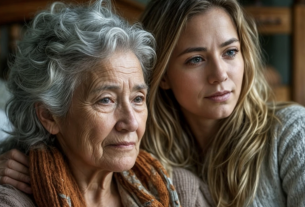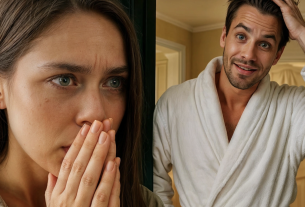Girl, do you even realize what you’ve done?!” Semen shouted, waving a ladle. “Soup on the floor, the customer splashed, and you’re just standing there like a statue!”
Alyona looked at the dark stain on the man’s expensive suit and felt her insides tighten. This was the end of her job. Six months of effort — and all for nothing. Now this rich man would make a scene, demand compensation, and she’d be fired without severance.
“Please, I’m sorry… I’ll clean it up right away,” she stammered, grabbing napkins from the table.
The man raised his hand to stop her:
“Wait. It’s my fault. I turned suddenly and got distracted by a phone call.”
Alyona froze. In two years of working as a waitress, she had heard all kinds of things, but a customer apologizing to her — that had never happened before.
“No, it was clumsy of me…” she muttered.
“Don’t worry. The suit can be cleaned. But did you get burned?”
She shook her head, still not believing what was happening. The man was about forty-five, with graying hair and glasses. He spoke calmly, without the fake polite tone usually put on by wealthy customers.
“Then let me change clothes, and you bring a new soup. Just be careful this time,” he smiled slightly.
Igor, the hall administrator, appeared out of nowhere.
“Mr. Sokolov, sorry for the incident! We will definitely compensate for the suit…”
“Igor Petrovich, no need. It’s fine.”
Alyona brought a new serving of soup, her hands still trembling. Sokolov ate slowly, occasionally glancing at her thoughtfully.
“What’s your name?”
“Alyona.”
“How long have you worked here?”
“Six months.”
“Do you like it?”
She shrugged. What was there to say? A job is a job. The salary is okay, and the team depends on luck.
“And where did you work before?”
The question was easy, but Alyona tensed inside. Rich men don’t just casually ask about waitresses’ pasts.
“At another café,” she answered shortly.
Sokolov nodded and didn’t ask more. He paid, left a generous tip, and left.
“You’re lucky,” Semen grumbled. “If I’d had a client like that in my youth, I’d be retired by now.”
A week later, Sokolov came to the restaurant again. He took the same table and asked to be served by Alyona.
“How are you?” he asked when she brought the menu.
“Fine.”
“Where do you live?”
“I rent a room.”
“Alone?”
Alyona put down the menu a little sharply.
“And?”
Sokolov raised his hands in peace:
“Sorry, I didn’t mean to pry. You just remind me of someone.”
“Who?”
“My sister. She was independent at your age too.”
Alyona felt something tighten inside. “Was” — meaning she’s no longer alive.
“Does she work somewhere?”
“No,” Sokolov paused. “She’s been gone for a long time.”
Their conversation was interrupted by another customer asking for the bill. When Alyona returned, Sokolov was finishing his salad.
“Can I come here often?” he asked. “I like it here.”
“Of course, it’s a public place.”
“And if I ask to always be served by you?”
Alyona shrugged. The customer is always right, especially when he pays well.
Sokolov started coming twice a week. Ordered the same thing: soup, salad, main course. Ate slowly, sometimes spoke quietly on the phone. The perfect visitor.
Gradually, he began to tell about himself. Owns a chain of hardware stores, lives with his wife in a house outside the city. They have no children.
“Where are you from?” he asked once.
“From the city,” Alyona answered evasively.
“Are your parents alive?”
“No.”
“Have they been gone long?”
“I don’t remember them. I grew up in an orphanage.”
Sokolov paused, his spoon hanging over the plate.
“Which one?”
“The fourteenth boarding school on Sadovaya.”
“Got it. How old are you?”
“Twenty-two.”
“When did you leave the orphanage?”
“At eighteen. First, they gave me a dormitory, then I rented on my own.”
Sokolov stopped eating. He looked at her strangely, as if just noticing.
“Is something wrong?” Alyona asked.
“No, it’s okay. It’s just… my sister also grew up in an orphanage.”
“Poor her.”
“Yes. I was twenty then, studying at university. I couldn’t take her in — I lived in a dormitory, barely making ends meet on a scholarship.”
“And then?”
“Then it was too late.”
There was such pain in his voice that Alyona didn’t ask more. It wasn’t her place to stir up someone else’s memories.
The next week, Sokolov brought her a gift — a small, neat box.
“What is this?”
“Open it.”
Inside were gold earrings — simple but elegant.
“I can’t take these.”
“Why not?”
“Because we hardly know each other.”
“Alyona, it’s just a token of attention. No strings attached.”
“For what?”
He paused a moment.
“Do you have any plans for the future?”
“What plans? I work and save money for an apartment.”
“Would you like to change jobs?”
“To what?”
“There’s a manager vacancy at one of my stores. The salary is three times higher than here.”
Alyona leaned back from the table.
“And do I have to do something for that?”
“Work. Receive goods, supervise salespeople, prepare reports. You’ll learn everything.”
“Why me?”
“Because you’re responsible. No complaints in six months, always polite to guests. And because I want to help.”
“Why?”
Sokolov took off his glasses, wiped them with a napkin.
“My sister was sent to an orphanage at twelve — our parents died in a fire. I was in my third year at university. I thought I’d hang on a couple of years, get my degree, find a good job, and bring her to me.”
“What happened?”
“She died of pneumonia, a year before I graduated. I found out about the funeral only a month later.”
Alyona was silent. The story was touching, but what did it have to do with her?
“I’ve thought my whole life: if I had acted earlier, dropped out, got a job somewhere…”
“So what? You both would have survived, instead of struggling alone?”
“Maybe. But she would be alive.”
“You can’t know that.”
“I do. They treated her badly there. If she had lived with me…”
“Listen, I’m very sorry about your sister. But I’m not her.”
“I understand. But let me at least try to fix something.”
Alyona took the box with the earrings.
“I’ll think about the job. But take these back.”
“Alyona, come on! It’s just a gift, no conditions.”
“That’s exactly why I’m not accepting it.”
At home in her rented room, Alyona told her friend Valentina, who grew up with her in the orphanage.
“I don’t believe in kind rich men,” Valentina said, biting an apple. “They all want something.”
“He acts like an older friend. Even like a father.”
“Even worse. That means he has strange ideas.”
“Stop it, Val. Don’t say nonsense.”
“Alyona, we heard many times as kids: don’t trust adults who are too kind. Remember what happened to Natasha Krylova?”
She remembered. Natasha left with a man promising the world. Returned pregnant and bruised.
“But the salary really is good…”
“Talk to Igor. He’s experienced.”
Igor was cautious about the offer:
“Alyona, rich people don’t give anything for nothing. He definitely has his own goals.”
“What goals?”
“Don’t know. Maybe he wants to cheat his wife. Maybe he’s looking for a replacement daughter. Maybe worse.”
“He says he wants to atone for his guilt to his sister.”
“And you believe him?”
“Why not? The story sounds plausible.”
“You’re smart, Alyona. But you don’t understand people well. You expect too much.”
But after a week, Alyona agreed. Not for the money, though it was important. She was just tired of carrying trays and putting up with customers’ whims every day.
The store was on the city’s outskirts, selling building materials. Staff: three salespeople, a loader, an accountant, and her.
Sokolov trained her for a week. Explained patiently, repeated without anger at mistakes.
“You have a good memory,” he said. “And you can find common ground with people. I think you’ll manage.”
The first month was hard. The salespeople didn’t accept her — young, inexperienced, and with a patron. But Alyona wasn’t used to giving up. She worked from morning till night, studied the assortment, memorized prices, learned to deal with suppliers.
Over time things improved. Sokolov came once a week — checked documents, talked to staff. He treated Alyona kindly, but without familiarity.
“How are things?” he usually asked.
“Okay. Getting the hang of it.”
“If something is unclear — call. Don’t hesitate.”
“Okay.”
“And how’s the housing? Still renting a room?”
“For now. But I’m already looking for an apartment.”
“Maybe I can help? I know some realtors.”
“Thanks, I’ll manage myself.”
He nodded and didn’t insist.
Two months later, Sokolov invited her to dinner.
“To a restaurant?” Alyona asked, surprised.
“No, home. My wife cooks great. She wants to meet you.”
Alyona hesitated. It felt awkward to refuse the boss, but going to strangers’ home was strange.
“Don’t worry,” Sokolov laughed. “We’re not scary. Just want to chat in a calm atmosphere.”
The Sokolovs’ house was big, with a garden and pool. Marina, his wife, greeted Alyona rather reservedly.
“Marina,” Alyona introduced herself, extending her hand.
A beautiful, well-groomed woman, but her gaze was cold.
“Come in, come in,” she said. “Boris told me a lot about you.”
“Hopefully good things.”
“Some good, some not,” Marina smiled, but her eyes stayed indifferent.
During dinner, Sokolov asked Alyona about work and plans. Marina barely spoke, only occasionally making sharp remarks.
“Have you thought about getting a higher education?” she asked.
“I have. Just not now.”
“Got it. Work is more important.”
“Marish,” her husband gently corrected.
“What? I’m just curious. Rare to meet people who become independent so early.”
“In orphanages, you have to grow up fast,” Alyona replied.
“Yes, of course. Boris told me about your… background.”
That “background” sounded like something low.
“Marina, we agreed,” Sokolov said more strictly.
“About what? I said nothing bad. On the contrary, I admire it. Not everyone can survive those conditions.”
Alyona understood: it was time to leave.
“Thank you for dinner. I have to go.”
“How to go? We just ate!” Sokolov protested.
“Got to get up early tomorrow.”
“I’ll take you.”
“No need, I’ll get there myself.”
On the way home, she thought about Marina. She clearly hadn’t accepted her. And it made sense — the husband suddenly began caring for a young girl from an orphanage, spending time and money on her. Any wife would worry.
The next day, Sokolov called.
“Alyona, sorry about last night. Marina was in a bad mood.”
“It’s okay.”
“No, it’s not. She had no right to behave like that.”
“I understand her. I’d worry too if I were her.”
“About what?”
“That my husband suddenly started helping some stranger.”
Sokolov was silent.
“You’re not a stranger to me. You’re… special.”
“Because I remind you of your sister?”
“Not only because of that.”
“Why else?”
“Because you’re strong. You didn’t break, didn’t complain about fate, didn’t lose faith. You keep moving forward.”
“There are many like that.”
“More than you think.”
A month later, what Alyona feared happened. She came to the store, and the staff were whispering.
“What’s going on?” she asked.
“Nothing special,” the senior saleswoman Svetlana replied. “Yesterday the boss bought an apartment.”
“What apartment?”
“A studio in a new building on Rechnaya. They say he’s putting it in your name.”
Alyona’s heart stopped.
“How do you know?”
“My son-in-law works in real estate. Says the papers are almost ready.”
Alyona waited until lunch and called Sokolov.
“We need to talk.”
“Of course. Come to the office.”
“Better at a café.”
“Okay. You know ‘Europa’ on Central? I’ll be there in half an hour.”
Sokolov was already waiting at the table.
“Something wrong at work?”
“Are you buying me an apartment?”
He didn’t deny it.
“Yes, I am.”
“Why?”
“I wanted to help you.”
“You don’t owe me anything.”
“I know. But it’s important for me to do this.”
“For what? What have I done for you?”
He took off his glasses, rubbed his eyes.
“Her name was also Alyona. She was a year younger than you when she died. Blonde, gray-eyed, stubborn. Just like you.”
Alyona felt a squeeze inside.
“And?”
“When I saw you, for a second it seemed — it was her. Grown up, matured, but the same.”
“Boris Viktorovich…”
“Wait. I know it’s silly. That you’re not her. But I needed to know that at least one child from the orphanage got a normal life. That I helped someone.”
“You’re not helping me. You’re helping yourself.”
He nodded.
“Maybe. But that doesn’t make the help any less real.”
“It does. Because you see not me. You see your dead sister.”
“That’s not true.”
“It is. That’s why I can’t accept the apartment.”
“Why?”
“Because I don’t want to be anyone’s substitute. Even a generous one.”
Sokolov was silent for a long time.
“What if I offered the apartment to someone else — not you?”
“Then I’d believe you really want to help.”
“So it’s about motives?”
“It’s about me not being someone’s memory.”
He stood up.
“Understood. Sorry for wasting your time.”
“Don’t be angry. I’m grateful for the job, for your belief…”
“For what? For using you?”
“For trying.”
He left, leaving money on the table.
The next day Alyona submitted her resignation. Gave it to the secretary.
“Please pass it on.”
“Boris Viktorovich valued you very much.”
“I just decided to change direction.”
That evening Sokolov called.
“Alyona, don’t make hasty decisions. Not because of our conversation.”
“I’m not because of that. I just realized I want to be a cook.”
“Really?”
“Absolutely.”
He was silent.
“Then good luck.”
“Thank you.”
Igor welcomed her gladly.
“Alyonka! We thought you forgot us.”
“I wouldn’t forget if there was something to lose,” she laughed.
Semen took her desire to study seriously.
“You have the right hands. The main thing is not to rush.”
Alyona enrolled in culinary college courses. Worked as a waitress, studied in the evening, practiced at home at night.
Valentina tried her dishes.
“Tasty. But why?”
“I don’t want to depend on anyone’s mercy.”
“Who did you depend on?”
Alyona told the whole story.
“You’re such a fool,” her friend shook her head. “They were giving you an apartment, and you refused.”
“They weren’t giving it. They wanted to pay for the role of a dead sister.”
“So what? An apartment is an apartment.”
“It matters to me.”
Six months later Alyona was already working as a cook’s assistant. The salary was less than before, but she felt she was in the right place.
One day, Sokolov came to the restaurant. Sat at his usual table. Alyona went to serve.
“Good evening. What will you have?”
“Soup of the day, Greek salad, grilled fish.”
“Okay.”
She brought the order; he thanked her. They ate in silence.
Before leaving, he stopped her.
“Alyona, can we talk?”
“Sure.”
“I wanted to apologize. For everything that happened.”
“No need.”
“You were right. I was looking for my sister in you.”
“And now?”
“Now my wife and I do charity. We help orphanages. But we don’t try to replace anyone anymore.”
Alyona nodded.
“Meeting you changed my life. Made me rethink everything.”
“Mine too.”
“How?”
“I believed in myself. Realized I can choose my own path.”
Sokolov smiled.
“Then we’re even.”
“Looks like it.”
He put money on the table and headed for the exit. At the door, he looked back:
“Good luck, Alyona. Real luck.”
“You too.”
When he left, Alyona cleared the table. He left exactly the right amount of tip. No more, no less.
And that was just right.



